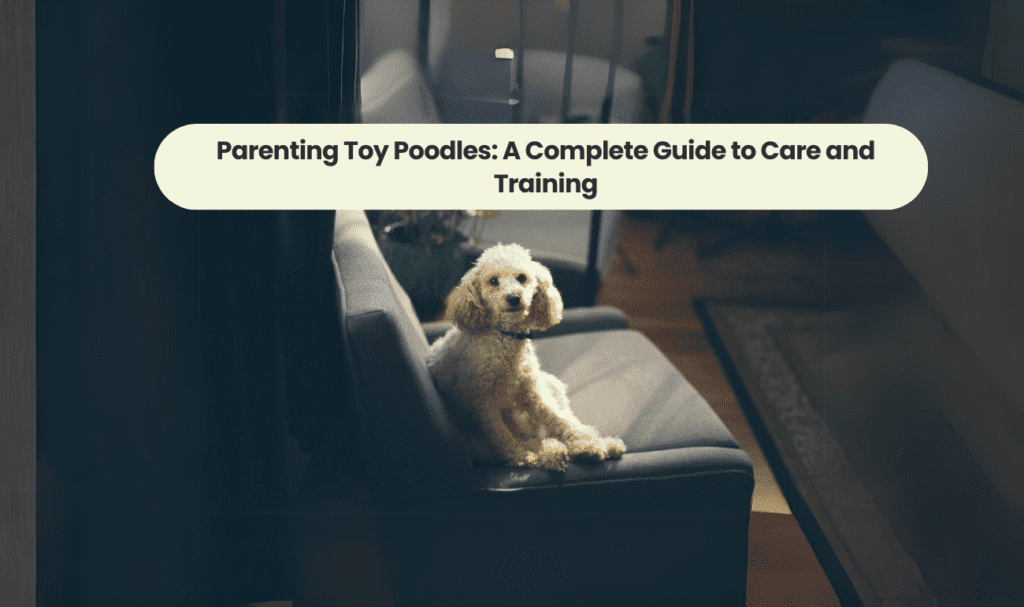If you’re considering adding a new furry member to your family, look no further than the adorable and intelligent Toy Poodle. With their teddy-bear cuteness and impressive agility, Toy Poodles have oodles of appeal. In this comprehensive guide, we will cover everything you need to know about parenting a Toy Poodle, from their appearance and temperament to their training and grooming needs. Whether you’re a first-time dog owner or already have experience, this guide will provide you with all the information you need to ensure the health and happiness of your Toy Poodle.
What Does a Toy Poodle Look Like?
Believe it or not, Toy Poodles have a rich history as waterfowl retrievers. Originally bred in Germany, their thick curly coats and webbed paws made them excellent swimmers. Over time, Toy Poodles were bred to be smaller companion pets. Today, they are one of the most popular breeds due to their highly trainable, playful, and affectionate personalities. Toy Poodles come in a variety of colors, including black, white, silver, cream, blue, brown, red, sable, and apricot.
Caring for a Toy Poodle Puppy
Bringing home a Toy Poodle puppy is an exciting time, but it’s important to ensure they receive proper care and nutrition from the start. Toy Poodles have specific dietary needs that support their growth and development. Feeding them a high-quality, wholefood diet is essential to provide them with the necessary nutrients. It’s important to avoid overfeeding, as excess weight can put strain on their growing bodies. Additionally, regular exercise is important for Toy Poodle puppies to burn off energy and prevent joint problems.
Toilet training is another crucial aspect of caring for a Toy Poodle puppy. Consistency and positive reinforcement are key to successful training. Take your puppy outside frequently and reward them with praise or treats when they eliminate in the designated area. Crate training can also be beneficial for toilet training and providing a safe space for your puppy.
Exercise and Grooming for Toy Poodles
While Toy Poodles have lower exercise requirements compared to larger breeds, they still need regular physical activity to keep them healthy and happy. Daily walks and playtime are important to prevent boredom and maintain their overall well-being. Swimming can be an excellent exercise option for Toy Poodles, as it is gentle on their joints.
Grooming is a significant aspect of caring for a Toy Poodle. Their thick, curly coats require regular brushing to prevent matting. Daily brushing is recommended to keep their coat in good condition and remove any debris. Professional grooming every four to six weeks is also necessary to maintain their stylish appearance. Additionally, regular ear cleaning, teeth brushing, and nail trimming are essential for their overall hygiene and health.
Read Also : How to train a poodle not to bite
Training a Toy Poodle
Toy Poodles are highly intelligent and eager to please, making them a joy to train. Positive reinforcement training methods work best with this breed. Using treats, praise, and play as rewards will motivate your Toy Poodle to learn and obey commands. Consistency and patience are key when training a Toy Poodle, and early socialization is important to ensure they are comfortable around people and other animals.
Common Health Issues in Toy Poodles
While Toy Poodles are generally healthy dogs, they can be prone to certain health issues. It’s important to be aware of these conditions and take preventive measures to keep your Toy Poodle in optimal health. Some common health issues in Toy Poodles include progressive retinal atrophy (PRA), patellar luxation, Legg-Calvé-Perthes disease, ear infections, dental disease, tracheal collapse, and von Willebrand’s disease. Regular veterinary check-ups and a balanced diet can help minimize the risk of these health problems.
Feeding and Nutrition for Toy Poodles
Proper nutrition is vital for the overall health and well-being of your Toy Poodle. Feeding them a high-quality, balanced diet that meets their specific nutritional needs is essential. Consult with your veterinarian to determine the appropriate portion size and feeding schedule for your Toy Poodle. Avoid overfeeding and monitor their weight to prevent obesity, which can lead to various health issues. Additionally, providing fresh water at all times is crucial to keep your Toy Poodle hydrated.
Toy Poodle Temperament and Behavior
Toy Poodles are known for their confident, loyal, and intelligent nature. They bond closely with their families and thrive on companionship. They generally get along well with children and other pets, but early socialization is crucial to ensure positive interactions. Toy Poodles have moderate energy levels and require mental stimulation to prevent boredom and behavioral issues. Regular exercise, playtime, and engaging toys can keep them happy and mentally stimulated.
Toy Poodle Adoption and Purchase
If you’re interested in adding a Toy Poodle to your family, there are various options available. Reputable breeders can provide you with a healthy and well-socialized Toy Poodle puppy. Make sure to do thorough research and visit the breeder’s facilities to ensure they meet ethical standards. Additionally, toy poodle rescues and shelters often have Toy Poodles available for adoption. Adopting a rescue dog can be a rewarding experience and provide a loving home for a dog in need.
FAQ’s
Are toy poodles hard to take care of?
Toy poodles can be high maintenance due to their grooming needs, but with proper care, they can be manageable pets.
How to raise a toy poodle?
To raise a toy poodle, focus on consistent training, socialization, regular grooming, and providing mental stimulation through toys and activities.
How do you discipline a toy poodle?
Discipline toy poodles with positive reinforcement training methods, such as rewards for good behavior and redirection or ignoring undesirable behavior.
How long do toy poodles have to stay with their mother?
Toy poodles should ideally stay with their mother and littermates for at least 8 weeks to learn important social and behavioral skills.
Conclusion
Parenting a Toy Poodle can be a rewarding experience, as these intelligent and affectionate dogs bring joy and companionship to any household. By providing proper care, training, and nutrition, you can ensure the health and happiness of your Toy Poodle. Regular exercise, grooming, and veterinary check-ups are essential to maintain their overall well-being. With love, patience, and dedication, you can create a strong bond with your Toy Poodle that will last a lifetime.
Additional Information: It’s important to note that Toy Poodles, like any dog breed, require socialization, mental stimulation, and love. They thrive in a nurturing environment where they are treated as valued family members. Regular playtime, training sessions, and quality time with their owners will contribute to their overall happiness and well-being.
Disclaimer: The information provided in this article is for educational purposes only and does not constitute veterinary advice. Always consult with a qualified veterinarian for personalized recommendations for your Toy Poodle.

